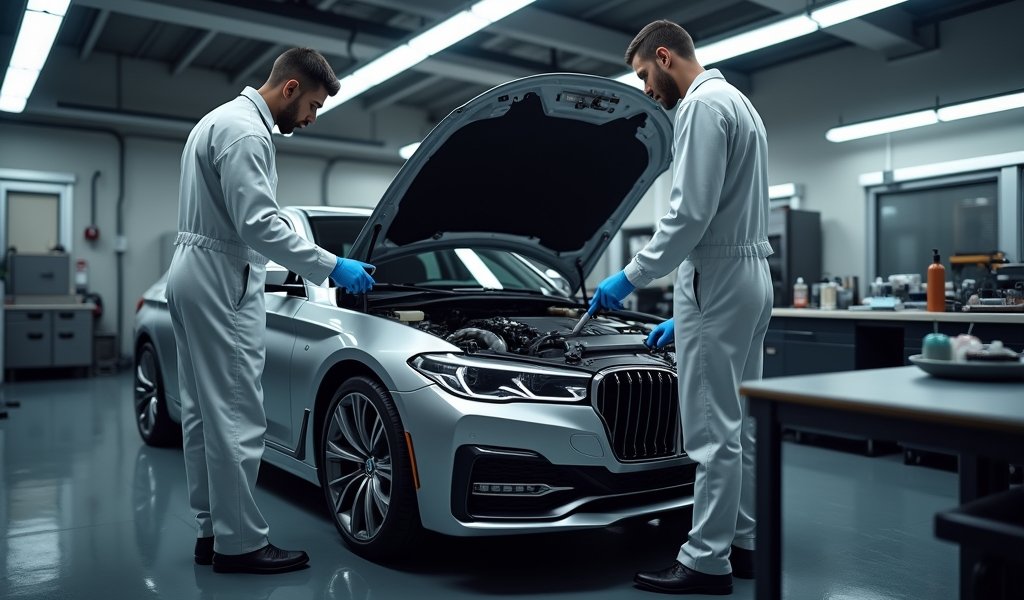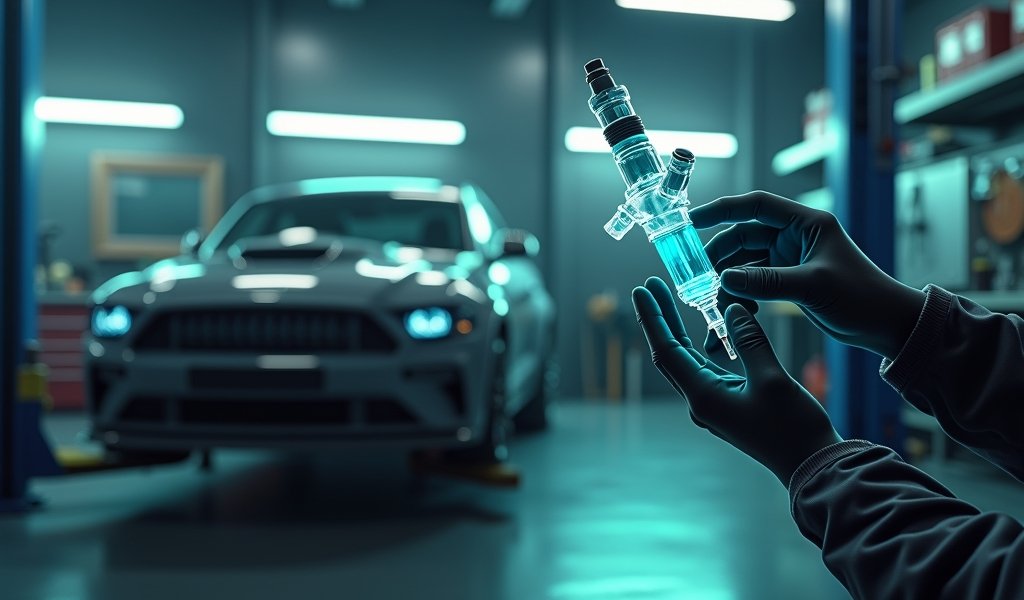Overview
This article provides a detailed guide to fuel injector cleaning options, comparing professional services ($75-$200) with DIY methods ($5-$100), while emphasizing preventative maintenance using quality fuel and regular cleanings every 30,000-40,000 miles. It explains how to recognize when injectors need cleaning versus replacement (which costs $400-$2,100), and outlines how proper maintenance saves money by preserving vehicle performance and fuel economy.
Table of Contents
- Understanding Fuel Injectors
- Signs Your Fuel Injectors Need Cleaning
- Professional Fuel Injector Cleaning
- DIY Fuel Injector Cleaning Options
- Cost Comparison: Professional vs. DIY
- Money-Saving Preventative Maintenance
- When Cleaning Isn’t Enough: Replacement Costs
- Conclusion
- Frequently Asked Questions
Understanding Fuel Injectors
Let me tell you about fuel injectors – they’re the unsung heroes of your engine. These precision components deliver a fine mist of fuel directly into your engine’s combustion chambers, ensuring the perfect air-fuel mixture for efficient burning.
Think of them as tiny showerheads that need to spray in a precise pattern. When working properly, they help your vehicle achieve optimal performance, fuel economy, and emissions. But like any component that handles fuel constantly, they can get dirty over time.
Fuel injectors become clogged primarily due to carbon deposits and fuel impurities that build up on the nozzle tips. This happens gradually as you drive – especially if you use lower-quality fuels or make lots of short trips where the engine never fully warms up.
Modern vehicles are particularly sensitive to injector performance issues. With stricter emissions standards and higher-performance engines, even slight injector clogging can impact your driving experience and fuel economy. That’s why maintaining clean injectors should be part of your regular vehicle maintenance routine.
Signs Your Fuel Injectors Need Cleaning
Your car has ways of telling you when those injectors need attention. Here are the most common symptoms of dirty fuel injectors:
- Rough idle or engine hesitation
- Poor acceleration or sluggish performance
- Decreased fuel economy (you’re visiting the gas station more often)
- Engine misfires or stumbling
- Difficulty starting, especially when warm
- Check Engine light illumination
I’ve seen countless vehicles roll into my shop with owners complaining about performance issues, only to discover that clogged injectors were the culprit. One customer was about to trade in her SUV for a newer model because it was “getting old and sluggish.” After a proper injector cleaning, she was amazed at the difference and kept the vehicle for three more years!
If you notice even one of these symptoms, it’s worth checking your injectors. Left untreated, dirty injectors can lead to more serious problems like catalytic converter damage or premature engine wear. An ounce of prevention is worth a pound of cure in this department.

Professional Fuel Injector Cleaning
When it comes to professional fuel injector cleaning, you have several options with varying costs and benefits. Let’s break them down.
Dealership Service
Dealership service departments typically charge between $100-$200 for fuel injector cleaning. They often use manufacturer-approved equipment and cleaning solutions, which can be a plus for newer or higher-end vehicles.
The benefit here is that dealership technicians know your specific vehicle model inside and out. The downside? You’re paying a premium for that specialized knowledge. In my experience, dealerships charge about 30-40% more than independent shops for virtually identical service.
Independent Repair Shops
Your local independent mechanic will likely charge $75-$120 for a complete fuel injector cleaning service. Most reputable shops use professional-grade equipment and cleaning solutions that match or exceed what dealerships offer.
I’ve owned my repair shop for over 15 years, and we typically charge about $89 for a standard 4-cylinder vehicle injector cleaning. This service includes a before-and-after performance test so customers can see the actual improvement.
Quick Lube Places
Some quick lube places advertise fuel injector cleaning for as little as $30-$60. Buyer beware: these are often just adding a cleaning agent to your fuel tank – something you could do yourself for $10-15.
True professional cleaning requires connecting specialized equipment directly to your fuel system and running pressurized cleaner through the injectors. If the service takes less than 30 minutes, they’re probably just pouring an additive in your tank.
What Professional Cleaning Includes
A proper professional fuel injector cleaning should include:
- Connecting specialized equipment to your fuel rail
- Running professional-grade cleaning solution through injectors under pressure
- Testing injector spray patterns and flow rates
- Inspecting fuel pressure and regulator function
- Checking for leaks or physical damage
- Before and after performance evaluation
The entire process usually takes 60-90 minutes when done correctly. Many shops also include cleaning of the throttle body and air intake as part of a complete fuel system service, which might increase the cost to $120-$180 but provides more comprehensive benefits.
According to a study published by SAE International, professional injector cleaning can restore lost fuel economy by up to 5-10% and reduce harmful emissions. For many drivers, that improvement alone pays for the service within a year.
DIY Fuel Injector Cleaning Options
If you’re the hands-on type or working with a tight budget, several DIY options can help maintain or restore your fuel injectors. Let’s look at what works and what doesn’t.
Fuel System Cleaners (Pour-in Products)
The simplest DIY approach is using a fuel injector cleaner that you pour into your gas tank. These products cost between $5-$25 depending on quality and typically treat a full tank of gas.
Popular brands include:
- Chevron Techron Concentrate Plus ($8-12)
- Lucas Fuel Treatment ($15-20)
- Red Line Complete Fuel System Cleaner ($12-18)
- STP Fuel Injector Cleaner ($5-8)
In my professional experience, Techron and Red Line products consistently outperform others. For mild cases of injector fouling, these can be quite effective, especially when used regularly as preventative maintenance.
The key is consistency – using these products every 3,000-5,000 miles provides much better results than waiting until you have a problem. Think of these as dental floss for your fuel system – regular use prevents bigger problems.
DIY Injector Cleaning Kits
For more serious cleaning, you can purchase a DIY fuel injector cleaning kit. These kits, ranging from $50-$100, connect to your fuel rail and allow you to run cleaning solution directly through the injectors – similar to a professional service.
These kits typically include:
- A pressurized canister
- Hoses and connectors
- Cleaning solution
- Detailed instructions
This approach requires basic mechanical knowledge and comfort working around your engine. You’ll need to locate your fuel rail, safely relieve fuel pressure, and make proper connections. If you’ve changed your own spark plugs successfully, you can likely handle this job.
The results from a properly used DIY kit can rival professional cleaning. However, the learning curve and time investment (expect to spend 2-3 hours your first time) are factors to consider when weighing this option against the cost of professional service.
Ultrasonic Cleaning
For the truly dedicated DIY enthusiast, ultrasonic cleaning represents the gold standard. This involves removing the injectors completely and placing them in an ultrasonic bath with special cleaning solution.
This method requires significant mechanical skill and specialized equipment (an ultrasonic cleaner costs $100-$300). It also means your vehicle will be undrivable during the cleaning process. However, the results are exceptional, as the ultrasonic waves can remove even the most stubborn deposits.
Unless you’re a serious enthusiast or professional, this method probably isn’t practical for most car owners. The time, tools, and expertise required usually make professional service more economical.
Cost Comparison: Professional vs. DIY
Let’s get down to brass tacks and compare the real costs of different cleaning methods:
- Professional cleaning at dealership: $100-$200
- Professional cleaning at independent shop: $75-$120
- DIY with premium fuel additives: $12-$25 per treatment
- DIY cleaning kit: $50-$100 one-time purchase + $10-$20 per cleaning for solution
- Ultrasonic DIY cleaning: $100-$300 for equipment + learning curve
Looking purely at numbers, DIY additives seem cheapest, but the effectiveness varies. If your injectors are already significantly clogged, you might need multiple treatments or stronger methods.
One approach I often recommend to my customers is to use quality fuel additives every 5,000 miles for prevention, then get a professional cleaning every 30,000-40,000 miles. This balanced approach provides good protection without breaking the bank.
The value proposition changes based on your vehicle’s condition. If you’re experiencing noticeable performance issues, a professional cleaning will likely provide the most immediate and reliable results. For vehicles running well, regular use of quality additives may be sufficient maintenance.
Don’t forget to factor in your time and comfort level. DIY methods save money but require time and some mechanical aptitude. Professional services cost more but provide convenience and expertise – often with a satisfaction guarantee.

Money-Saving Preventative Maintenance
An ounce of prevention is worth a pound of cure – especially when it comes to fuel injectors. Here are my top tips for keeping your injectors clean and saving money in the long run:
Fuel Quality Matters
I can’t stress this enough: the quality of fuel you use directly impacts injector cleanliness. Major brands typically contain better detergent packages that help prevent deposit buildup.
Consider using “Top Tier” gasoline, a standard developed by major automakers that contains more deposit-control additives than the minimum EPA requirement. According to Consumer Reports testing, Top Tier fuels can reduce carbon deposits by up to 19 times compared to regular gasoline.
While Top Tier fuel costs slightly more (about 3-5 cents per gallon), the long-term benefits to your fuel system make it worthwhile. It’s like choosing quality oil for your engine – a small investment for significant protection.
Regular Maintenance Schedule
For optimal fuel system health, follow this schedule:
- Every 5,000 miles: Add a quality fuel system cleaner
- Every 15,000-20,000 miles: Replace your fuel filter (if externally mounted)
- Every 30,000-40,000 miles: Consider professional injector cleaning
This regimen keeps deposits from accumulating to problematic levels. For higher-mileage vehicles or those with known carbon issues, you might want to increase the frequency of additive treatments.
Driving Habits That Help
How you drive affects injector cleanliness more than most people realize:
- Avoid frequent short trips where the engine never fully warms up
- Take a 20-minute highway drive at least once a week to help clear deposits
- Don’t let your fuel level consistently run below a quarter tank (sediment collects at the bottom)
- Occasionally run your engine at higher RPMs to help clean deposits (when safe to do so)
These simple habits complement your maintenance routine and can significantly extend the intervals between needed cleanings. I’ve seen dramatic differences in injector condition between similar vehicles based solely on driving patterns.
Combining quality fuel, regular use of cleaners, and good driving habits can save you hundreds in affordable auto service costs over your vehicle’s lifetime while maintaining optimal performance and efficiency.
When Cleaning Isn’t Enough: Replacement Costs
Sometimes, despite your best efforts, fuel injectors may be too damaged or worn to be restored through cleaning. Here’s how to recognize when replacement becomes necessary and what costs to expect.
Signs That Cleaning Won’t Help
Based on my years in the shop, these are the tell-tale signs that your injectors need replacement rather than cleaning:
- Fuel leaking externally from the injector body
- Persistent misfire codes returning after cleaning
- Consistent failure in flow rate tests
- Physical damage to the injector (cracked body or damaged electrical connector)
- No improvement after multiple professional cleaning attempts
Modern fuel injectors are remarkably durable, but they do have a finite lifespan. Most quality injectors should last 100,000-150,000 miles with proper maintenance, though some may fail earlier due to fuel quality issues or manufacturing defects.
Replacement Cost Breakdown
Replacing fuel injectors represents a significant investment compared to cleaning. Here’s what to expect:
- Parts cost: $50-$200 per injector (OEM quality)
- Labor cost: $200-$500 (varies by vehicle accessibility)
- Total for 4-cylinder: $400-$1,300
- Total for 6-cylinder: $600-$1,700
- Total for 8-cylinder: $800-$2,100
Luxury and European vehicles typically land at the higher end of these ranges, while domestic and Asian vehicles often cost less. Direct injection systems (common in newer vehicles) generally cost more to service than traditional port injection.
Aftermarket injectors can save you money, with quality units costing 30-50% less than OEM parts. In my shop, I often recommend quality aftermarket injectors from brands like Bosch or Delphi for out-of-warranty vehicles. They perform excellently while saving customers significant money.
Weighing Your Options
Before committing to injector replacement, consider:
- Vehicle age and value – extensive repairs on older vehicles may not make financial sense
- Other fuel system components – fuel pumps and pressure regulators often fail around the same time
- Warranty coverage – some vehicles have extended warranty coverage for fuel system components
- Driving needs – if you’re planning to sell soon, minimal repairs might be sufficient
For many drivers, a single professional injector cleaning (costing $75-$120) is worth trying before committing to full replacement. I’ve seen cases where a thorough cleaning restored injectors that other shops had condemned for replacement, saving customers hundreds of dollars.
Conclusion
Maintaining clean fuel injectors is one of the most cost-effective ways to preserve your vehicle’s performance, fuel economy, and longevity. Whether you choose professional cleaning or DIY methods depends on your comfort level with car maintenance, budget constraints, and the current condition of your injectors.
For most drivers, I recommend a balanced approach: use quality fuel, add a premium injector cleaner every 5,000 miles, and invest in professional cleaning every 30,000-40,000 miles. This strategy provides excellent protection without breaking the bank.
Remember that the cost of fuel injector cleaning (whether $15 for DIY additives or $100 for professional service) pales in comparison to the potential costs of neglect: reduced fuel economy, diminished performance, and eventually, injector replacement at $400-$2,000+.
Your vehicle is a significant investment, and its fuel system is the lifeblood of its performance. A little preventative maintenance goes a long way toward keeping those injectors spraying the perfect mist for thousands of miles to come.
Frequently Asked Questions
How much does professional fuel injector cleaning cost?
Professional fuel injector cleaning typically costs between $75-$120 at independent shops and $100-$200 at dealerships. The price varies based on your location, vehicle make/model, and whether additional services like throttle body cleaning are included.
How often should fuel injectors be cleaned?
For preventative maintenance, fuel injectors should be professionally cleaned every 30,000-45,000 miles. Using fuel additives every 5,000 miles can extend these intervals for vehicles using quality fuel.
Can I clean fuel injectors myself?
Yes, you can use pour-in fuel additives ($5-$25) for light maintenance or DIY cleaning kits ($50-$100) for more thorough cleaning. Results vary based on the severity of deposits and the quality of products used.
How do I know if my fuel injectors need cleaning?
Watch for symptoms like rough idle, hesitation during acceleration, decreased fuel economy, hard starting, or check engine light illumination. These signs typically appear gradually as deposits build up.
Is fuel injector cleaning worth the cost?
Yes, fuel injector cleaning is worth the cost as it can improve fuel economy by 5-10%, restore lost performance, and prevent more expensive repairs. The service typically pays for itself in fuel savings within a year for regularly driven vehicles.


Pingback: How Much Does Car Tuning Cost? Pro Tips - knowsyourcar.com